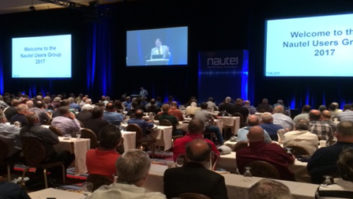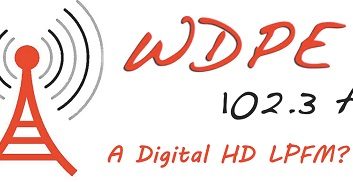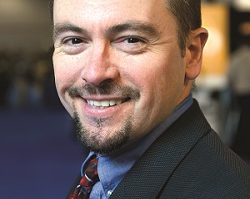Thanks to those who wrote, asking if I’m still at RW!
The prior issue contained my column but I left off my usual logo. I guess that’s what happens when I print photos instead of text. I used this space recently for pictures from the fall NAB Radio Show.
I haven’t gone anywhere; but it’s sure nice to know I would be missed!
* * *
Two years ago I decided RW would present occasional articles profiling young engineers. I was tired of hearing readers and industry leaders insist on the truth of what everyone “knew”: that there are no future radio engineers coming into the industry.
Since then we’ve reported on the developing careers of people like Rob Bertrand, Ben Ary, Andy Mika, Gabe Joseph, Aaron Ishmael, Fred Bennett, Joseph Brannan, Nathan Chervek, Kyria Timmons and Amanda Alexander, in a series written by Ken R. Deutsch.
Even younger folks, though, often express concern about the lack of appeal radio engineering presents to the next generation.
Amanda Alexander lamented that she’d never seen a radio station employee at a school career day. RW contributor Tom Osenkowsky read that and wrote in to offer his view on the challenges involved.
“As a presenter at several career day events — at two high schools, a university with an EE program and at several independent career fairs — I must say I attracted little serious attention,” Tom tells me. “Those few who inquired asked the right questions and did show genuine interest.
“The time period in question ranges roughly from 1995 to 2005. I did have a booth at the Maritime Aquarium in Norwalk, Conn., for a few years. I set up a scope connected to a mic mixer, an opened CD player to show how a CD changes speed with changing tracks and some other hands-on visuals.
“Little serious interest was shown by the attendees — middle and high school students. We were not invited back.”
Tom composed handout sheets detailing the various positions in a typical broadcast station, not just on-air work.
“A look at some realities may answer why there is a lack of interest. In one way, Amanda answered her own question. Keeping an antenna field clear of weeds is important, one of the dirty parts of the job. Given the technical knowledge, expertise and experience required for a broadcast engineer, plus the compensation offered, I can understand the lack of interest.
“I faced these challenges when dealing with my authors during the NAB Engineering Handbook Tenth Edition project,” continued Osenkowsky, one of the book’s associate editors.
“Picture a station with a solid-state transmitter, a tube standby transmitter with satellite receivers, digital automation/audio storage, analog and digital mixing consoles and AM directional array. The technology ranges from the 1930s through the present. One must have RF audio and IT expertise. Quite a challenge.
“An IT technician is usually billed out at least $125/hour plus travel. No weed clearing, rusting hornet infested ATUs, spilled beverages in consoles, etc. — basically it’s clean work, with overtime for weekends or after-hours. Given a choice, what would be yours?
“It’s refreshing to see an interest in the broadcast industry,” Osenkowsky concluded, but “keeping pace with technology is difficult since few employers will compensate or support the continuing education that is necessary to deal with the installation and maintenance of this new gear. Just look at the new generation of satellite receivers. They are computers, with an RF front end.”
Ivory tower
A different but related point comes from Art Reis, who (like Amanda Alexander) works for Crawford Broadcasting.
He wrote in a recent edition of the corporate engineering newsletter that the company has a new part-time remote engineer, an Air Force veteran who is trying to work his way through college on the GI Bill.
“His faculty advisors are trying to discourage him from the career path he has chosen, that is, a broadcast engineering-related field,” Reis writes.
“Their tack seems to be that broadcasting is not a worthy choice for a person with an EE degree. They are trying to get him to leave a paying job and instead become an intern, a non-paying position, in something more worthy. He is being urged to attend so-called ‘internship fairs’ to seek such a position, without pay.”
Art has a problem with this. “While we in broadcasting are approaching a manpower crisis in the one area which is vital to keeping the industry going, here we have some weirdo academic type trying to discourage a person who has made broadcast engineering his life’s work from gaining experience in just that career.
“Now, I don’t consider it fair to extrapolate from that, especially considering Brian’s experience; but I wonder how widespread this sort of discrimination is — and yes, that’s what I’m calling it because that’s what it is.”
The young man in question has been mentored by very good broadcast engineers over the last couple of years, Reis feels. “It would be a crying shame if he would abandon his dream because some snotty career advisor seems to think that a career doing the one thing that I and a lot of us dedicated engineers felt born to do is unworthy of his talents and training.”
Art isn’t an EE; he doesn’t have a degree from a technical institute. His degrees are in broadcast arts and sciences.
“Still, I want to know if the kind of treatment that he is getting from his advisors is any kind of trend in academia these days. And if it is, somehow, we in this business have to put a stop to it.
“Once again, it seems radio engineering needs to do a better job of marketing itself. Who is speaking up for our careers at the educational level?”
Art makes an excellent point: If this is a trend, someone is missing the boat.
“RF is still extremely important, and it still should be taught, maybe as a requirement, for an EE degree.
“But for those who think that life revolves only around the ‘1s and 0s’ crowd, let me tell them … that there is more than enough room in this business for people who know their way around computers and networking. Frankly, we need more people who can do both, not people who discourage their students from doing one or the other.
“Not only is a mind a terrible thing to waste. So is a dream.”











